OCCUPY CENTRAL - DAY 27: Full coverage of the day’s events
Hong Kong developers deny pro-democracy protests will dent property profits
State warns of economic damage caused by Occupy but investors remain bullish about city
PUBLISHED : Thursday, 23 October, 2014, 1:25pm
UPDATED : Friday, 24 October, 2014, 2:35am
Pro-democracy protests are now in their fourth week. Photo: May Tse
Leading developers yesterday dismissed suggestions that protracted pro-democracy protests would dent their investments and business in Hong Kong.
Sino Land chairman Robert Ng Chee Siong said he has "no hesitations" about continuing to invest in Hong Kong.
"Occupy Central has been on people's minds for almost a year. When we submitted our bid for the mega project in Kwun Tong, we knew the protests were being planned," Ng said after the property group's annual general meeting yesterday.
He said the company's willingness to take on the Kwun Tong redevelopment - a project that will yield 2,000 flats and entail an investment of HK$18 billion - attests to Sino Land's confidence in the city. "It is a huge investment. We have no hesitation about continuing investments in Hong Kong," Ng said.
His remark comes on the heels of statements by Secretary for Commerce and Economic Development Greg So Kam-leung who said some overseas investors had expressed doubts over Hong Kong's business environment. So has even suggested that some overseas investors might suspend their investment plans in the city because of the agitation.
A joint tender from Sino Land and Chinese Estates Holdings last month won the Kwun Tong contract, the Urban Renewal Authority's single biggest project. Sino Land has a 90 per cent stake in the project.
Ng said he is not at all worried that the pro-democracy protests, now in their fourth week, would erode the rule of law in the city. "What has happened will not last forever. Hong Kong's success is built on rule of law, which is well respected by everyone in the city. Recent events will not affect what's in people's hearts and minds," he said.
The company said its property sales would proceed as scheduled.
Sino Land executive director Daryl Ng Win Kong said the Occupy movement had had little impact on the property market.
"We haven't launched new projects during the Occupy unrest but sales of our remaining units are still satisfactory," said Ng, whom is the chairman's son. "We have seen positive sales outcomes from other developers' new projects in past weeks."
Victor Tin Sio-un, an associate director at Sino Land, said the firm would release 1,300 units in three projects for pre-sale soon.
Separately, Hysan Development general manager for retail leasing, Kitty Choy Man-wai, said the Occupy movement had had no significant impact on sales and visitors to Hysan Place on Hennessy Road.
"We have received no complaints from shops at the ground level as the mall has several entrances from different streets," she said.
This article appeared in the South China Morning Post print edition as Developers deny protests will dent property profits
Barriers torn down amid 'escalating violence' at Mong Kok protest zone
Police again warn Mong Kok 'on verge of a riot' as radical protesters and troublemakers clash
PUBLISHED : Thursday, 23 October, 2014, 2:02pm
UPDATED : Friday, 24 October, 2014, 11:23am
Emotions run high as a group of anti-Occupy Central protesters clash with pro-democracy demonstrators in Mong Kok yesterday. Photo: Felix Wong
Part of a Mong Kok street blocked by Occupy supporters was reopened to traffic yesterday after several men tore down barricades amid angry scenes.
 Police reiterated their warning that Mong Kok was "on the verge of a riot" amid what they said was "escalating violence".
Police reiterated their warning that Mong Kok was "on the verge of a riot" amid what they said was "escalating violence".
The unidentified men removed wooden boards from a section of Portland Street near Langham Place and ripped up other barricades on Argyle Street. But another section of Portland Street remains blocked. The men said they were not court bailiffs acting for transport operators who have been granted injunctions ordering clearance of the roads.
"I'm coming to clear the rubbish. Why do I need bailiffs?" one of the men, identifying himself as "a man of righteousness", said. "I'll just rip off whatever [barricades] I see."
Police arrived to mediate after a row broke out between the men and protesters. Officers took the boards to the side of the road, enabling vehicles to enter Argyle Street from Portland Street.
Police spokesman Chief Superintendent Steve Hui Chun-tak said 11 people, aged 32 to 82, had been arrested in Mong Kok since Wednesday afternoon for common assault, indecent assault, possession of offensive weapons, disorderly conduct and dropping objects from buildings.
"There is an escalating trend to serious public disorder and it is on the verge of a riot," Hui said. "There are radical protesters and troublemakers mixing in the illegal assembly. Large-scale confrontation could be sparked at any moment."
Police are searching for a South Asian man after an online video clip showed him use a box cutter to hit a protester twice around the waist in the Mong Kok protest zone on Wednesday. He was among a group who tried to remove obstacles to traffic and were stopped by a group of Occupy protesters at about 6pm, the YouTube video showed.
The clip, recorded by Civic Passion, showed the attacker being grabbed by a red-shirted protester during a scuffle. He hit the protester's abdomen with the cutter before handing it to his friends and leaving.
A witness said the victim did not need medical treatment and a senior police officer said it appeared the cutter blade was not extended or he would have suffered serious stab wounds.
The officer said police had not received any complaint of a stabbing in Mong Kok but were looking for the victim and attacker.
Four injunctions have been sought from the High Court to clear barriers at Occupy protest zones. Three have been granted - two in Mong Kok and the other in Admiralty. Judge Thomas Au Hing-cheung will decide today whether to continue them.
Additional reporting by Thomas Chan and Timmy Sung
READ MORE: To view all the latest Occupy Central stories click here
An earlier version of the story incorrectly stated that lawyers for alleged police beating victim Ken Tsang had criticised Mr Judge Thomas Au Hing-cheung in a writ. In fact, the criticism was directed against the Commissioner of Police. The error was introduced in the editing process. We sincerely apologise for the error.
This article appeared in the South China Morning Post print edition as Barriers torn down amid 'escalating violence'
Occupy-related complaints of police misdeeds must be properly investigated
Albert Cheng says the Hong Kong force has unwittingly become a political tool of the government. Its good name must not be smeared
Police officers advance on a protest encampment in Mong Kok over the weekend. The prolonged tensions have taken a toll on frontline officers. Photo: AP
The Occupy protests are now in their fourth week with no sign of abating. As expected, the two-hour televised dialogue between the student leaders and government officials on Tuesday did little to move both sides from their respective entrenched positions. The occupiers are unlikely to go home soon.
The way the democracy movement has unfolded is beyond the expectations of the protest organisers as well as the authorities. The government had planned for a scenario in which up to tens of thousands of peaceful demonstrators could be removed from Central in a day or two. That has turned out to be wishful thinking.
Chief Executive Leung Chun-ying has adopted an uncompromising approach since the unpopular decision of the National People's Congress to impose stringent restrictions on the nominating procedures for the chief executive election in 2017. The fact that hundreds of thousands of citizens have taken to the streets shows that the problem at hand is primarily a political one, rather than a matter of law and order, as Leung would like to portray it.
Instead of seeking a political compromise, officials have spent most of their time highlighting the clashes between the police and the protesters. Various front groups have been mobilised to challenge, sometimes violently, the activists for the inconvenience and economic losses caused by Occupy.
Leung's latest move was to discredit through selected news media the local democracy movement as being manipulated by foreign interests. He has indeed been rather successful in distracting public attention from his own scandal about having pocketed some HK$50 million from a foreign firm under dubious circumstances.
Undoubtedly, most of us in Hong Kong take pride in our police force and are grateful for the men and women in uniform for their service. However, the hard-earned reputation of the police is now at risk as the force has been used as a political tool to shield Leung from the onslaught of public opinion.
The decision to fire tear gas had nothing to do with the police on duty, who were there to execute orders. Given their professional training, it would not have been much of a problem for the police to have cleared the occupied sites if they were given a clear order.
However, Leung, who endorsed the use of force against the occupiers, has apparently changed his mind, as Beijing apparently did not want to see a brutal crackdown in Hong Kong. The police are thus torn between the yellow and blue ribbons.
The prolonged tension has taken a toll on frontline officers. They are now told to use batons instead of tear gas. Individual officers have been caught on camera defying the police guideline in using their batons. In one case, even those manning a first-aid tent were hit. Incidents like these have fuelled public mistrust.
In particular, the footage of seven officers allegedly assaulting a protester in a dark corner has done irreparable damage to the public image of the police. The officers might have been overworked and/or provoked. The police have pledged an impartial investigation into the incident. Facts about the case will emerge should it be brought before a court of law.
The bottom line remains that the police are duty-bound to ensure the personal safety of a person in custody, irrespective of what the suspect has done before being arrested.
Some police sympathisers have demanded that the case be dismissed, on the grounds that the officers could not possibly be given a fair trial because of the overwhelming media coverage. This helps no one. The best way to assist the officers, if they are charged, is to ensure that they get the best legal defence.
Meanwhile, the Independent Police Complaints Council's inertia warrants a special mention. In the past, the body would have taken the initiative to observe the police in action during a protest of such scale. However, its new chairman, Larry Kwok Lam-kwong, thinks otherwise.
So far, the police have received about 900 Occupy-related complaints against officers. Twenty-three of these have been handed over to the council for investigation.
The council's credibility hinges on its independence. Yet, even before they can tackle the complaints, the political neutrality of the body has been called into question, not least because Kwok himself is seen to be a supporter of Leung and aligned with the anti-Occupy camp.
If council members have to excuse themselves from the investigations because of a conflict of interest, the council may end up in a ridiculous situation where there are not enough supposedly independent members to take on the numerous cases. This is yet another manifestation of the negative effects of Leung's plan to put his cronies in major public offices.
Albert Cheng King-hon is a political commentator.taipan@albertcheng.hk
This article appeared in the South China Morning Post print edition as Occupy-related complaints of police misdeeds must be properly investigated
Democracy is on its last legs
Dabing Li says now and in the past, democracies have failed to work as promised. Inevitably, they become a race to the bottom for the vote of the ignorant masses, resulting in disastrous policies
PUBLISHED : Thursday, 23 October, 2014, 5:18pm
UPDATED : Friday, 24 October, 2014, 1:50am
Democracy seems to have failed in many places, both socially and economically, and often in glaring fashion.
The ongoing Occupy movement by pro-democracy protesters has wreaked havoc in Hong Kong. There is no end in sight. Yet, in this melodramatic saga, we may be forgetting the basics: What exactly is "democracy"? Who deserves it? Does it really work?
Western-style "democracy" is a seductive proposition, especially for those with little education and achievements but loaded with "grievances". However, if we look through human history, it seems that this "democracy" hasn't really worked too well.
"One man, one vote" was first instituted in Greece around the fifth century BC and now - with its many mutations - dominates the Western world. But it has inherent problems. The voting masses are often ignorant of the issues at hand and susceptible to political manipulation. Witness the ascent of Adolf Hitler, the democratically elected leader of the German Third Reich.
In recent years, "democracy" seems to have failed in many other places, both socially and economically, and often in glaring fashion. In 2008, the global financial crisis engulfed the world. It started in the US where democracy has, for decades, bred generations of consumers who have had the notion of entitlement ingrained into their minds.
In that name, they indulged themselves, lived beyond their means, and elected politicians who engaged in perpetual popularity contests by promising voters all kinds of free economic and social benefits funded by taxes and the treasury. Apparently, such democracy can help the lower ranks achieve the "American dream" - a suburban McMansion; hence, subprime mortgages to help low-income people buy one.
These subprime junk loans exploded after having been encouraged by the US Congress, extended by happy bankers, then diced, sliced and packaged into asset-backed securities, and sold to financial institutions all over the world. The inevitable mortgage defaults in 2008 triggered the global financial crisis. Was that American democracy at work?
Like falling dominoes, all Western democracies suffered. The worst hit was Greece, where, for a long time, voters kept electing those who promised the most from their national treasury. When the Greek treasury had been bled dry, politicians started to borrow - the so-called sovereign debt. They promised and promised, borrowed and borrowed, and spent and spent. Greeks began to take it for granted, as if it were their entitlement to live the high life on other people's money - until Greece defaulted on its sovereign debt.
When the necessary belt-tightening - austerity - ensued, the Greeks suddenly found that the high life they thought was their entitlement was just a sham, financed by other people's money, which they could not repay. They took to the streets of Athens, smashed windows, burned cars, and engaged in hand-to-hand combat with riot police, all in the glare of global media, all in the name of democracy, entitlements and grievances.
That was Greek democracy at work.
The question is why - why is democracy failing so broadly and so miserably? It is failing in Tunisia, Egypt and Libya. It has already failed in the Philippines and Thailand. But why the United States, where education and democratic institutions are well developed? Why Greece, the cradle of democracy and civilisation?
Unfortunately, the answer may lie in human nature. We simply may not deserve democracy; we are just not made that way. We are all, by nature, selfish. We are helplessly susceptible to manipulation, particularly to perverse promises of free breakfasts, lunches and dinners.
The most basic mechanism of democracy is "one man, one vote". By the nature of demographics everywhere, the majority of votes are at the bottom of each society. There are always more workers than technocrats. And so, in order to get votes, politicians race to the bottom. There, the voters care about themselves. What's good for society, for its future, even if understood, often becomes irrelevant. In opinion polls and voting booths, only their own self-perceived narrow interests count. All politicians understand this. They race to the bottom, bribing the masses with the national treasury. All modern-day democracies inevitably degenerate into this race to the bottom.
The premise for democracy is that voters know what's good for all and will vote rationally; this premise is utopian. Another democracy utopia is "majority rule". In reality, a tiny minority can often exert a disproportionate amount of influence.
In Hong Kong, for example, an illiterate old lady, manipulated by a few in the name of "democracy", became the poster opposition figure against a proposed key infrastructure project. The delays that she caused will cost Hong Kong billions of dollars. She and people like her are the masses, and they have the votes.
Should any advanced society let these people decide how to arrange its vital affairs? I'm afraid not.
In Singapore, a benign dictatorship has transformed a tiny poor economy, in less than 50 years, into a first-world manufacturing and service hub, where economic prosperity and racial harmony are the envy of all.
In China, for the past 30 years, a unique system of consultative decision-making by the government has succeeded in lifting hundreds of millions out of poverty, and generated unprecedented economic growth and cultural revival. By purchasing power parity, China is now the world's largest economy.
It seems that history is being rewritten about the seductive system we call democracy. The writing is on the wall; Western-style democracy may be on its last legs.
Dabing Li, a Hong Kong-based former management consultant and investment banker, was born in Beijing and lived through the Cultural Revolution. He studied in the US, and attended Harvard Business School
This article appeared in the South China Morning Post print edition as On its last legs
Student, Occupy leaders announce vote on government’s reform proposals
Democratic exercise will ask whether students' federation should accept the government's offers
PUBLISHED : Thursday, 23 October, 2014, 11:26pm
UPDATED : Friday, 24 October, 2014, 7:24am
Occupy Central co-founder Benny Tai Yiu-ting said they hoped to get a stronger endorsement from the people through the poll. Photo: K. Y. Cheng
Protesters in "Umbrella Plaza", Admiralty, will be polled on whether student leaders should accept the government's offers made at talks on Tuesday on ending nearly a month of sit-ins.
Student leaders and Occupy Central organisers said the poll would be held on Sunday.
One of Hong Kong's most respected pan-democrat politicians, and an academic close to student leaders, urged them to take seriously the government's offers to submit a report to the State Council's Hong Kong and Macau Affairs Office on sentiments expressed during the protests and to set up a platform for dialogue on constitutional development.
The founding chairman of the Democratic Party, Martin Lee Chu-ming, and Chinese University political scientist Ivan Choy Chi-keung said the students should keep an open mind on engaging in more talks with officials.
In August, the National People's Congress Standing Committee set strict limits on the 2017 chief executive election and 2016 Legislative Council election.
The Federation of Students has rejected the government's offers, saying the report should have some influence on the Standing Committee's decision and that the dialogue must address elections in 2016 and 2017.
Occupy Central co-founder Benny Tai Yiu-ting said they hoped to get a stronger endorsement from the people through Sunday's poll, which will be conducted in Admiralty from 8pm to 11pm. People will be asked whether they support the federation's stance.
The head of the Federation of Students, Alex Chow Yong-kang, said: "The vote can quantify the people's demand that the government give us a real response."
Protesters said that while the vote would be a democratic exercise, it should be the government that offers a solution.
Lee said: "Beijing and the Hong Kong government shut the door to dialogue with students in the past.
"Now there is a crack between the door and its frame. Why don't we put a foot there and see what we can get?"
And Choy said: "It's unrealistic to expect the deadlock to be resolved through one meeting."
Meanwhile, the United Nations Human Rights Committee is writing to the Hong Kong government urging it to protect "the right to stand for elections" in achieving universal and equal suffrage.
A commentary by a People's Daily commentator, published on the front page of the newspaper yesterday, criticised student leaders for demanding amendments to the Basic Law and reversal of the Standing Committee's decision.
This article appeared in the South China Morning Post print edition as Students to give protesters vote on response to talks
Luxury brands Fendi, Versace and Burberry upbeat despite protests
PUBLISHED : Friday, 24 October, 2014, 4:19am
UPDATED : Friday, 24 October, 2014, 4:19am
Occupy Central activists gather around a branch of the luxury Fendi brand on Canton Road. Photo: EPA
The heads of several international luxury brands have dismissed the idea that pro-democracy protests in the city have damaged Hong Kong's status as a world-class retail destination.
"We are here to reinvigorate the confidence in Hong Kong," Fendi chief executive Pietro Beccari said at the opening of its Landmark flagship store yesterday. "My view on doing business in Hong Kong has not changed and this store in particular is dedicated to locals.
"I think the scale of the images the first week impacted the business but now the traffic is much better. I think there is good traffic today - I was in Canton Road [where Fendi has a store]. We are here to open a store because our confidence in Hong Kong hasn't changed."
There is no clear end in sight for protesters who have now been out on the streets for nearly a month blockading roads at prime shopping districts Causeway Bay and Mong Kok.
Beccari's bullishness is in stark contrast to earlier reports, including from Financial Secretary John Tsang Chun-wah, that the protests had damaged the economy. A senior economist at ANZ Banking Group estimated the protests had cost retailers HK$2.2 billion, representing 6 per cent of monthly retail sales.
Hong Kong, which typically makes up a tenth of total worldwide sales for high-end labels, is a favourite destination for mainland tourists, who love to do their shopping here.
The opening of Fendi's multifloored boutique tails fellow Italian luxury brand Versace's flagship store launch in Harbour City last Friday and a visit from its chief executive Gian Giancomo Ferraris.
Just a few days before that, Burberry chief financial officer Carol Fairweather said the purveyor of £1,200 (HK$15,000) trench coats has a wide network of stores that customers could visit even if some stores are affected by the protests.
"We've got 17 stores in Hong Kong ... clearly Hong Kong is very important to us," Fairweather said.
Although she did not comment on numbers for this month, she noted that Hong Kong sales up until September grew at double digits. The student sit-in began on September 29.
The confidence was echoed by Longchamp chief executive Jean Cassegrain, who visited Hong Kong earlier this month. "Yes, it did affect business shortly. We had barricades here on Canton Road, but not for a very long time," he said.
He even joked that protests were a common occurrence in France. "For us there is nothing much to write home about as we have protests very often.
"I think Hong Kong will remain a very exciting place to stay, to do shopping, to entertain," Cassegrain said.
"Hong Kong has also proven to be very resilient, so frankly I'm not worried for the city. I think somehow Hong Kong will still be very much up and running."
This article appeared in the South China Morning Post print edition as Luxury brands upbeat on HK despite street unrest
A message for the protesters: it's time to leave the streets
Most Hongkongers are sympathetic to the cause - but take it to the halls of power
It's time to leave the streets
There has been a revolution in the way Hongkongers view the police force over the last 40 years.
When I first arrived here in 1972, most people either loathed or feared the police because of the extensive corruption that prevailed. Vice activities were rampant, with gambling dens everywhere, quite blatant drug divans and sordid brothels all run by or with the permission of the local constabulary. In the 1970s, it was even necessary for the government to organise a "Fight Violent Crime" campaign because the law and order situation was so precarious.
Old hands remember what happened next: in 1974, the Independent Commission Against Corruption came into being and began to nail corrupt officials, particularly in the police. By 1977, the force had had enough and there was a mutiny, followed by an amnesty.
From that point on, the police evolved into the highly professional and clean force we see today. They earned the respect and gratitude of the entire (non-criminal) community. Whereas 40 years ago, there was a local saying that it was better for one's daughter to stand around on street corners than to join the police, for at least 30 years now, becoming a police officer has been a perfectly respectable career for both men and women.
The younger generation has, of course, no recollection of the bad old days and takes our tranquil way of life for granted.
All of which is by way of backdrop to the "umbrella movement" and its occupation of several key road junctions. I have a message for the protesters: most Hongkongers are sympathetic to your cause and we believe you are sincere in wanting the best possible political system for our future. You are right to be angry with the government, which has behaved disgracefully towards all of us and has treated the students particularly shabbily.
But what you are doing is causing serious hardship to your fellow residents. Your quarrel is not with them; it is with the government. You should stop the street protests now (it would have been best if you had called a halt after two weeks) and devise new strategies that inconvenience or embarrass the government instead.
Sooner or later, the police will be ordered to remove you using minimum necessary force. Whether that is because of a court order or a political decision does not matter. They will have to remove you.
When that moment comes, you must go quietly: remember, the police are not your enemy. They are one of the community pillars that make our city such a great place to live, that makes us so different from the mainland.
If you forget, and resist with force, then I am afraid you will forfeit the goodwill many feel for your cause and discredit the very principles for which you say you stand. That would be a very sad day. Written with love from the bottom of my heart.
Mike Rowse is managing director of Stanton Chase International and an adjunct professor at Chinese University. mike@rowse.com.hk
This article appeared in the South China Morning Post print edition as A message for the protesters: it's time to leave the streets
Study area in Admiralty protest zone is like a breath of fresh air
PUBLISHED : Friday, 24 October, 2014, 6:30am
UPDATED : Friday, 24 October, 2014, 6:30am
Choi Kai-sing at the study area in Harcourt Road. Photo: SCMP
In the open air of the Admiralty protest zone, students hit the books in the middle of the road at row after row of handmade tables and chairs, equipped with lamps and Wi-fi.
The furniture is the handiwork of a team of volunteers who are tirelessly putting salvaged construction waste to use.
It helps students who choose to study at the sit-in, instead of in a library, to show solidarity with the other protesters.
Common to some of them are the family disputes, even big fights, that they have had to endure to attend the protests.
"My parents tried telling me not to come to the protest," Form Six pupil Chun Yat-long, 17, said. "We got into a huge argument. I was in tears but left. Afterwards, they gave up trying to talk me out of it and told me to be careful."
Before Occupy Central began its action late last month, Yat-long had joined a week-long class boycott initiated by student leaders. He went back to school at the end of it, returning to Admiralty on non-school days.
The teen's determination to attend the protests was sealed shortly after police fired 87 tear-gas canisters into the crowds on September 28. "I am prepared to risk my life if necessary," he said.
His parents remarked on how violent the protests seemed on television, with which he disagreed vehemently. "We're very peaceful. We haven't so much as broken a pane of glass," he said.
"My parents compared it to the violent riots of 1967 [in which extremists used bombs]. I said that was not a fair comparison."
The disagreement had left him barely speaking to his parents, he said, but he would not stop protesting until high-ranking officials talked to the protesters in person so they could get an accurate picture of Hongkongers' sentiments about Beijing.
Like Yat-long, university student Choi Kai-sing, 21, had a story of family discord to share, though his was not quite as drastic. "My mother says we're blocking the streets, that we're affecting people's lives without any chance of achieving our goals," Choi said. "Most of my friends and classmates had arguments with their families, too, but they still think coming here is worth it."
Choi said he would keep coming back until the government committed to true universal suffrage for the chief executive election and abolished functional constituencies. "It was hard catching up on what I had missed in class, but it's worth it for the future of Hong Kong."
Not all the students face parental objections. Some even believed they had an easier time studying at the camp. "I became more diligent," said university student Winnie Yuen Hoi-ying, 20. "When I can't sleep, I work on assignments ... If I were at home, I might sleep rather than work."
Yuen and the other student protesters acknowledged that since the government had taken weeks to meet their protest leaders for talks, they would have to stay on for a while if they wanted to see real change. But the study area meant they would not have to give up schoolwork, they said.
This article appeared in the South China Morning Post print edition as Area for study in protest zone like a breath of fresh air
China won't budge on Hong Kong poll decision, plenum statement shows
PUBLISHED : Friday, 24 October, 2014, 6:30am
UPDATED : Friday, 24 October, 2014, 7:01pm
Communist Party vows to uphold 'one country, two systems'. Photo: Xinhua
The Communist Party's key meeting ended yesterday with a pledge to guarantee implementation of "one country, two systems" and maintain the long-term prosperity of Hong Kong in accordance with law.
Analysts said it suggested Beijing was unlikely to yield on its decision over Hong Kong's political reform.
The remarks came with protests against Beijing's restrictive framework for the 2017 election for the city's chief executive well into their fourth week.
Academics said the remarks were in line with Beijing's stance on Hong Kong's political development - that electoral reform must be carried out within the framework of the Basic Law.
"It is not common for Beijing to elaborate on the 'one country, two systems' policy from the perspective of law," Shenzhen University law Professor Ye Haibo said.
"It shows that Beijing wants to reiterate the importance of handling the relationship between the central government and Hong Kong and the city's political reforms in accordance with law - both the Basic Law and the decisions by the National People's Congress Standing Committee."
The committee has said only two or three candidates would be allowed to stand in the race and they would need the support of at least half the nominating committee.
Zhang Dinghuai, deputy director of Shenzhen University's Centre for Basic Laws of Hong Kong and Macau, said the communiqué from the fourth plenum signalled there was no chance Beijing would retract the decision.
"The Basic Law clearly stated that the candidates need to be nominated by a nominating committee," Zhang said.
Professor Dong Likun, a senior research fellow at the Institute of Hong Kong and Macau Affairs, a think tank under the State Council's Development Research Centre, said: "Retracting the decision would be dismantling the basis of rule of law in Hong Kong - the Basic Law."
This article appeared in the South China Morning Post print edition as Party vows to uphold 'one country, two systems'
Spat at, insulted, but still doing their duty: policewomen tell their stories
Service on front lines tougher than it looks, say policewomen say; verbal and physical assaults, 20-hour shifts and public enmity all take a toll
PUBLISHED : Friday, 24 October, 2014, 6:30am
UPDATED : Friday, 24 October, 2014, 10:47am
A policewoman tries to stop an anti-Occupy protester from breaking a police cordon to charge at pro-democracy protesters during a confrontation in Hong Kong on October 13, 2014. Photo: Reuters
Two policewomen say they have withstood verbal and physical insults during the last three weeks while working up to 20-hour shifts policing the Occupy protests. Male officers have suffered the same abuse, they say.
"Sometimes we feel really angry, but we have to suppress our emotions because this is our job and we have the duty to see it through," said one sergeant named Joanne.
Joanne belongs to a 27-member all-woman special team charged with clearing barricades set up by Occupy protesters. They also handle female demonstrators.
She said she had never seen protesters - especially those in Mong Kok - "so fierce" in her 24 years on the force.
"What you see on TV is totally different from what you truly experience at the scene," she said. "Protesters in Mong Kok are more complicated and harder to handle than [you] imagine. No matter man or woman, they all throw obscene language about your families at you. Sometimes they spit on you."
Joanne's husband is also a frontline police officer at Occupy. She said that one day when her husband, who was in uniform, was walking towards an MTR station with several uniformed colleagues, someone suddenly slapped the back of his head. The officers arrested the man for attacking police. Joanne said she did not understand why people had to attack officers when they were only doing their jobs.
Joanne said that one week she worked seven days straight, 12 to 20 hours a day. She and her husband barely saw each other, as they worked different shifts.
Teresa, a chief inspector and frontline commander at the protests, said television viewers couldn't always see from the footage whether protesters had moved forward towards police when there were clashes.
She said many colleagues who were injured would not see a doctor because they did not want to take sick leave.
"They are willing to work non-stop because they don't want their brothers and sisters [colleagues] to have to take on additional work," she said.
Both officers were speaking in interviews arranged by the police force.
Police salary scales were recently posted online, prompting criticism that officers were complaining while earning handsome sums. The salaries shown ranged from HK$19,545 to HK$230,550 a month.
"Salary is one of the reasons, but we are not working so hard only for the salaries," said Teresa. "When you are sworn at so much every day, when your family [is] so worried about you, if there was no other reason [for it], you wouldn't keep doing the job."
This article appeared in the South China Morning Post print edition as Spat at, insulted, but still doing their duty
Don't compromise Hong Kong's basic principle of equality before the law
Surya Deva says it goes against the Basic Law to deny the lower strata of society a say in political governance. For the sake of the government's legitimacy, the chief executive must build an inclusive society
PUBLISHED : Friday, 24 October, 2014, 4:40pm
UPDATED : Friday, 24 October, 2014, 6:23pm
One may argue that democracy is no panacea, but denying even an opportunity to compete for public office is worse than not being able to win the race.
Since assuming office in July 2012, Chief Executive Leung Chun-ying has hardly taken a wrong step in triggering a governance crisis in Hong Kong. Enough has already been said about the biased report to the National People's Congress Standing Committee, which resulted in a highly restrictive and arguably unconstitutional decision on August 31. Then Leung failed to show the required courage and leadership skills to engage democracy protesters at the outset and offer them legitimate concessions to resolve the crisis.
His latest step, giving an interview to the "foreign" media, was perhaps to better reach the so-called "external forces" fuelling the democracy demands in Hong Kong. In the interview, Leung, among other things, said that containing populist pressures was one of the reasons the nominating committee under Article 45 could not give proportional representation to Hongkongers earning less than HK$14,000 per month.
The subsequent clarification posted on the chief executive website that "the design of the Basic Law requires the chief executive to take into account the needs of all sectors with equal importance" does not really help much.
Giving equal importance does not mean according identical treatment to different people. Moreover, why should the lower strata of society be denied any say in political governance in the name of achieving "balanced representation"? Such an outcome is in sharp contrast with the pro-poor image Leung carefully cultivated during his election campaign.
Poor Hongkongers should not be at the welfare mercy of a local government controlled by Beijing and tycoons. The Basic Law does not really contemplate or legitimise this kind of exclusion and continued disempowerment.
The Standing Committee decided that the requirement for the nominating committee to be "broadly representative" will be satisfied if it is modelled on the current Election Committee. However, it is worth recalling that this committee was modelled on the selection committee for electing the first chief executive.
For historical reasons, even if the 400-member selection committee was regarded as broadly representative in the 1990s for a Hong Kong breaking free from its colonial past, it can by no means be treated as broadly representative for a special administrative region of China in 2017.
The nominating committee must be representative of Hong Kong people rather than merely of various business sectors, professions, occupations and religions. While there need not be an exact numeric representation, it should not be built on an institutionalised exclusionary policy for certain sections of society.
In the current Election Committee, how many people really represent, for example, Hongkongers living below the poverty line, senior citizens, women, the lesbian, gay, bisexual and transgender community, people working in informal sectors, self-employed people, students, homemakers, and people belonging to religious, linguistic and racial minorities?
Excluding certain people from having a say in the political process on economic grounds would be inconsistent with the equality guarantee under the Basic Law as well as the International Covenant on Civil and Political Rights.
Leaving aside legal arguments, let us also not forget that poor people are poor not merely because of their birth. In most cases, they remain poor because they are denied access to development capital - whether it is a lack of adequate nutrition, health services and housing; limited access to quality education and vocational training, or the availability of finance to start a business.
Rather than rationalising the continued exclusion of the less fortunate sections of Hong Kong society from the mainstream, Leung should have offered them diverse development ladders.
One may argue that democracy is no panacea and that it does not treat poor people any better. There is some truth here, but being denied even an opportunity to compete for public office is much worse than not being able to win the race. If the lower strata of society has no hope for political or economic empowerment, why should they follow laws and believe in the rule of law?
Businesses should not be afraid of a democratic Hong Kong because democracies have safeguards in place to protect the interest of minorities. Nor should we be greatly worried about populism because unsustainable welfare policies are weeded out by increasingly mature voters.
At the same time, tycoons should not take for granted that the law is an instrument to serve only their interests. Nor should they assume that the free market economy implies a total absence of laws and policies aimed at redistributing inequitable accumulation of wealth.
Instead of continuing the colonial legacy of unrepresentative, exclusionary and divisive governance, the chief executive should work towards establishing a more inclusive and representative government. Leung should know by now that much more than his personal reputation as a leader is at stake here.
Democracy or no democracy, Leung and future chief executives have no option but to cultivate the legitimacy of the local government in the eyes of Hongkongers. Doing so will also help Beijing to overcome some of its unfounded fears about Hong Kong.
But this goal of legitimacy is hardly achieved by flying an elite group of tycoons to Beijing to meet the president, while using force against non-elitist democracy protesters.
Surya Deva, an associate professor at City University's school of law, specialises in business and human rights, and comparative constitutional law
This article appeared in the South China Morning Post print edition as Equal before the law
Occupy Central "tank" carries message of peace, says creator
PUBLISHED : Friday, 24 October, 2014, 5:05pm
UPDATED : Friday, 24 October, 2014, 5:41pm
The "tank" is made up of a tent, an umbrella and water bottles. Photo: AFP
Despite occasional rumours of a crackdown at the sites of pro-democracy protests in Hong Kong, the appearance of a "tank" at the main Admiralty camp has barely raised a stir.
That’s because this tank is a symbol of peace, the work of an artist and survivor of Tiananmen Square in June 1989.
It’s made up of a tent, with a green-and-pink striped umbrella for a turret and over 400 water bottles for its gun and tracks. It took Miso Zo, a New York-based artist and student protester in Beijing in 1989, about three days to create. (Miso Zo is a pseudonym, as the artist did not wish to provide his real name.)
"I was a student at Tiananmen Square and a tank came to us," said Zo, 59. "Now Hong Kong students are doing it again here, reminding me of history. The tank is a reminder of the past."
Zo said that he was afraid that the same Tiananmen-style crackdown would happen again in Hong Kong so he offered this symbol of peace as his wish for a calm and peaceful solution. A bouquet of white lily and yellow chrysanthemum has been placed in the tank’s gun.
"The tank also means the students here," he said. "We are also a tank. We can fight, but it’s a peaceful fight."
Twenty-five years ago, Zo was a student at Luxun Academy of Fine Arts in Shenyang. Young and hopeful, he joined the student pro-democracy movement at Tiananmen Square and stayed there for 20 days, until tanks drove in and crushed his dream.
"Our dream was finished when the tanks came," he said. In the same year, he escaped to the United States with the help of a friend. Now his whole family is living in New York.
He came to Hong Kong in early October to support the Occupy movement. He said at first he just wanted to paint something but then, seeing many people recycling empty water bottles, he started to come up with the idea of incorporating bottles into an artwork.
He visited the mainland in April – for the first time since he left for New York – and he was disappointed by the widespread corruption. But he said he is still hopeful for China’s future and he is optimistic for the Occupy movement.
"Sooner or later, China is going to become democratic," he said. "This is a trend of time. No one can change it."
Tung calls for end of democracy protests
(10-24 15:42)
Hong Kong's former leader Friday urged democracy demonstrators to leave the streets calling their protest a "gross violation'' as he warned the consequences of continuing the rallies beyond a month were "very serious''.
Tung Chee-hwa, Hong Kong's first chief executive after the 1997 handover who was himself ousted after huge protests, said the movement needed to be brought peacefully to an end.
"We need to end this occupation because not only... is it hurting livelihood of people but it's a gross violation of the law,'' Tung told reporters during his first public comments since the protests began nearly four weeks ago.
"One month is a long time already and the consequences of prolonging this occupation is very, very serious,'' he said of the movement's impact on the city's economy.
Parts of the city have been paralyzed by 27 days of mass rallies and road blocks calling on Beijing to rescind its insistence that Hong Kong's next leader be vetted by a loyalist committee ahead of the 2017 elections.
Tung also lent his support to the city's embattled leader Leung Chun-ying.
"What he is looking for is a peaceful ending to the occupation, he is very calm and rational in dealing with this issue,'' he said.
"During this time where there are many risks, I feel he has performed very well and has also gained the trust of the Chinese government.''
Tung had his own share of troubles in handling pro-democracy protests when 500,000 people took part in a rally against a proposed national security bill in 2003, forcing his administration to shelve it.
It was a key factor in his resignation eighteen months later. --AFP
© 2014 The Standard, The Standard Newspapers Publishing Ltd.
Civil servants split on protest action
Friday, October 24, 2014
Civil servants who have shown support for the Hong Kong democracy push on a Facebook page have now followed up with an open letter to answer critics.
The group of civil servants from various departments have been posting encrypted pictures of their official passes on the page "Civil Servants Support Umbrella."
Now has come the open letter, which was published as an advertisement in Ming Pao, to hit at two official civil servant associations that on October 20 accused the disobedience movement of holding Hong Kong hostage.
The line taken by the Government Employees Association and the Hong Kong Civil Servants General Union did not represent everyone's views, the group said.
On a claim "that Occupy Central was incited by politicians," the group said most protesters want a better Hong Kong and followed "non-violent principles."
But there was also the admission: "We know that many citizens do not share our goals and feel unhappy because of the inconvenience in their lives."
Back on the October 20 thrust, they said the statement was not only unhelpful in resolving issues but could cause a bigger rip in society.
But the group said they prayed for a good ending, with requests for democracy granted and order restored.
It ended with: "To all protesters, civil servants and citizens, we stand together for a better Hong Kong."
The chairman of the Federation of Civil Service Unions, Leung Chau-ting, said he hoped both sides would restrain themselves so that differing opinions would not cause a split within the civil service.
The federation also called "for all civil servants to remain politically neutral, otherwise when asked to carry out some tasks they may find bones in eggs."
And a government spokeswoman said: "Civil servants must ensure the opinions they express do not prevent them from carrying out their duties with a professional and fair attitude." QI LUO
© 2014 The Standard, The Standard Newspapers Publishing Ltd.
Court battle as ban on road blocks challenged
Jasmine Siu
Friday, October 24, 2014
Three plaintiffs seeking to extend the interim injunction barring occupiers from blocking roads in Mong Kok and Admiralty are expected to request a court order to involve police in the execution of the injunction.
The interim injunction granted by the High Court on Monday night expires at 10am today.
The injunction application this morning, however, will have to answer to a challenge made by a Mong Kok occupier, Ng Hoi-pong, 38, who was granted legal aid yesterday.
The hearing in chambers will be held before judge Thomas Au Hing-cheung.
People Power lawmaker Albert Chan Wai-yip said the legal arguments involved are complicated as they touch on personal issues and human rights.
University of Hong Kong law professor Eric Cheung Tat-ming said given the number of individuals involved, the court has to consider the feasibility of a thorough execution of arrest warrants. "The court will have to consider whether the arrest warrant will be applicable to only persons identifiable, or to all individuals based on the nature of offenses," he said.
Cheung also warned that the court order must be specific or bystanders watching the occupation may risk getting caught up in the bailiff's execution.
An interim injunction against the occupiers was each granted to Chi Luen Public Light Bus, Lau Hoi-ping and Tam Chun-hung on behalf of the Hong Kong Taxi Association and the Taxi Drivers and Operators Association, and CITIC Tower's owner Golden Investment.
In the written judgment, High Court judge Jeremy Poon Shiu-chor emphasized that although the court is not a forum for political debates, the question of whether the occupiers can continue their activities should be resolved in a peaceful and legal manner in court.
"When the demonstrations in question based on civil disobedience have taken place for so long, in such a scale which has affected so many people and which has the real risk of turning into civil disorder, I do not think the fact that the demonstration is civil disobedience, no matter how noble the underlying cause the participants may consider it to be, can constitute a factor which militates against the granting of an injunction," Poon said.
He commented that the protesters' conduct is "disproportionate" and that arguments with "any reliance on the fundamental rights to freedom of assembly, demonstration, will unlikely succeed."
He added: "No one can possibly claim a monopoly of using the public highway in total disregard of the interests of his fellow citizens, no matter how honorable or noble his cause may be."
© 2014 The Standard, The Standard Newspapers Publishing Ltd.
http://www.scmp.com/topics/occupy-central
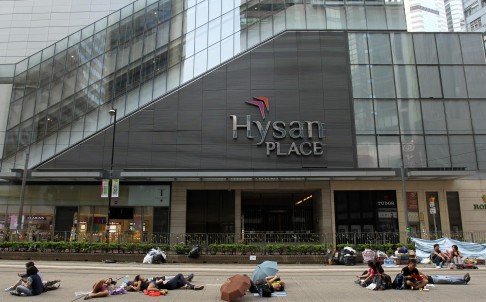

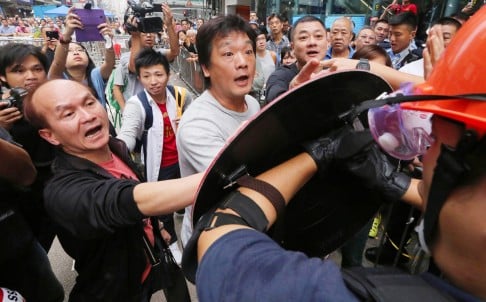
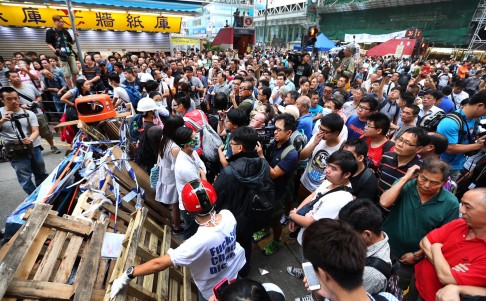
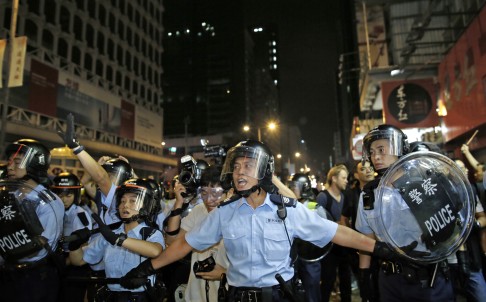
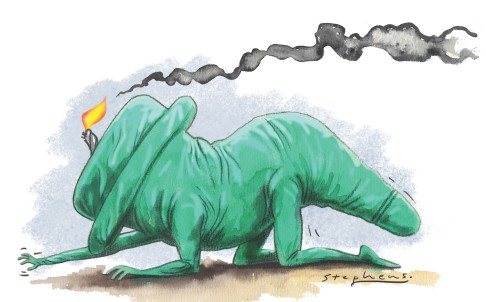
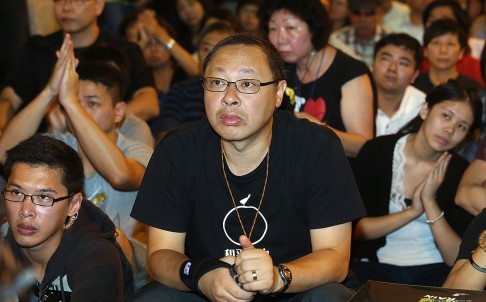

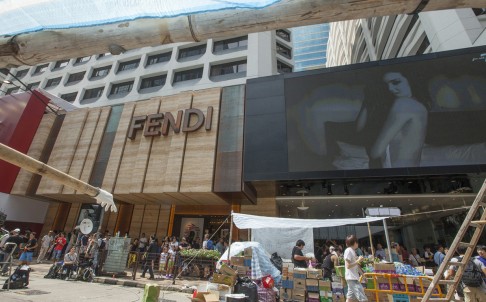
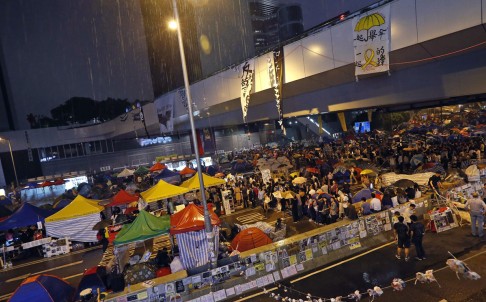
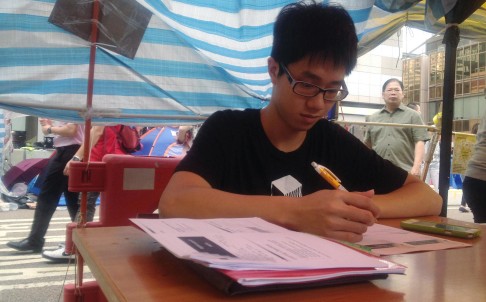
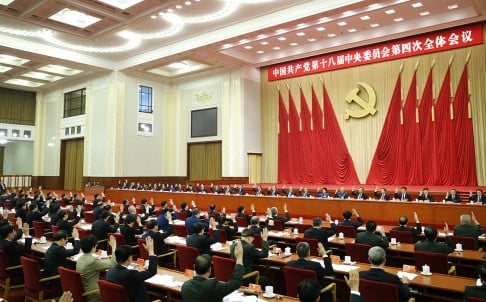
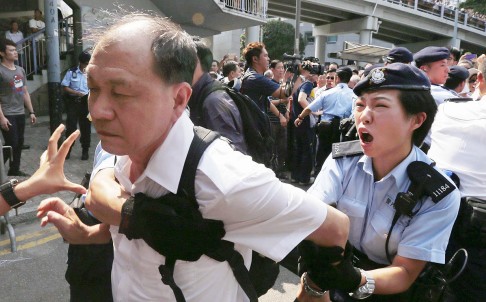
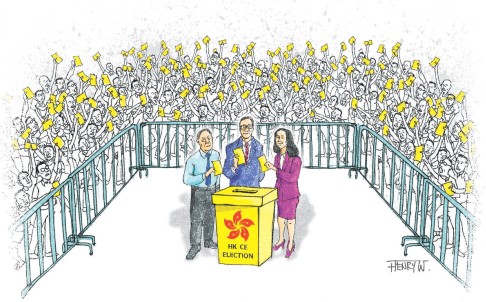
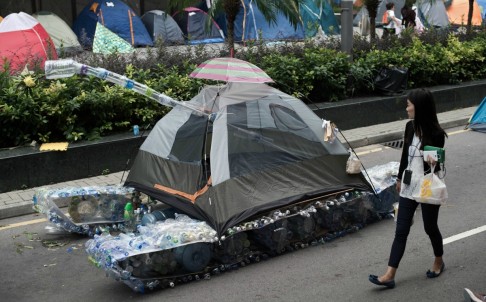
沒有留言:
張貼留言